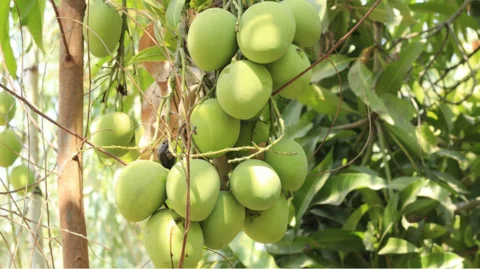About Mango
A mango is a tropical fruit that belongs to the genus mangifera. It is native so South Asia but is now cultivated in various tropical and subtropical regions around the world. Mangoes are knownfor their sweet and juice flesh, vibrant colors and unique flavor.
The mango fruit is typically large and oval-shaped, with a smooth, thin skin that can range in color from green to yellow, orange, red or a combination of these colors. The flesh inside is succulent, with a central seed or pit. There are many different varieties of mangoes, each with its own distinct taste, texture and aroma.
Mangoes are not only known for their delicious taste but also valuable and popular for their nurtitional content. They are a rich source of vitamins as well as minerals like potassium including vitamin A and vitamin C. In addition to these essential nutrients, mangoes also contain antioxidants and dietary fiber, making them a healthy and beneficial addition to a well-balanced diet. Mangoes contribute to meeting nutritional needs and supporting overall health.
Mangoes are commonly consumed fresh, but they can also be used in a variety of culinary applications, including smoothies, salads, salsas, desserts and juices. They are a staple fruit in many tropical cuisines and are enjoyed by people around the world.
Health Benefits of Mango
Mango is indeed a nutrient-rich fruit with numerous health benefits . Here are some key advantages:
Rich in Vitamins and Minerals: Mangoes are rich in nutrients and provide numerous health benefits. One of its significant benefits is that it is rich in vitamins and minerals. Mangoes are indeed an excellent source of essential vitamins and minerals. Mangoes provide plenty of nutrients and vitamins, including vitamin A, vitamin C, vitamin E and potassium. These vitamins and minerals play an important role in supporting immune function, maintaining healthy skin, and promoting overall wellness. Mangoes are rich in nutrients that contribute to a healthy and balanced diet.
Aids Digestion: Mango is a nutrient-rich fruit that offers several health benefits, including aiding in digestion. Mangoes contain enzymes like amylase, which help break down carbohydrates during the digestion process. The fiber content of mango helps in regular bowel movements and prevents constipation. Mangoes contribute to a healthy digestive system, making it easier for the body to absorb the nutrients it needs from the food it eats.

High in Antioxidants: Mangoes are not only delicious but also rich in health benefits. One of its main benefits is that it is high in antioxidants. Mangoes contain powerful antioxidants like beta-carotene and quercetin. These antioxidants play an important role in protecting the body from oxidative stress, fighting free radicals and reducing the risk of chronic diseases. Mangoes can contribute to overall health and wellness by providing a powerful dose of beneficial antioxidants and reduce the risk of chronic disease and support cellular health.
Boosts Immunity : Mango is a nutrient-rich fruit with various health benefits, including the ability to boost immunity. Mangoes are especially rich in vitamin C, a powerful antioxidant that plays an important role in supporting the immune system. The high vitamin C content of mangoes strengthens the immune system, helping the body fight infection and illness. Adequate vitamin C intake is essential for the production and function of white blood cells, which are vital for fighting infection. Mangoes help the body defend itself against common infections and contribute to overall health.
Supports Eye Health : Mango is a nutrient-rich fruit that offers various health benefits, including support for eye health. Mangoes are rich in beta-carotene, which helps maintain vision and eye health, a precursor to vitamin A, which is essential for maintaining vision and overall eye health. Vitamin A plays an important role in supporting corneal health and preventing conditions such as night blindness. Mangoes help contribute to the proper functioning of the eyes and maintain optimal vision.
Promotes Heart Health : Mango is a Mango is a nutrient-rich fruit that has several health benefits, including promoting heart health. Mangoes contain potassium and fiber which are very beneficial for cardiovascular health.
- Potassium Content : Mangoes are a good source of potassium, an essential mineral that helps regulate blood pressure. Adequate potassium intake is associated with a lower risk of high blood pressure, improving overall heart health.
- Fiber Content : The fiber present in mangoes helps in lowering cholesterol levels. High cholesterol is a risk factor for heart disease and adding fiber-rich foods like mango to your diet can contribute to maintaining a healthy cholesterol profile.
Aids Weight Management : Mangoes are nutrient-dense fruits that offer a variety of health benefits, including the potential to aid in weight management, which helps reduce overall calorie intake.
- Fiber content : Mangoes are a good source of dietary fiber, which provides a feeling of fullness and helps control appetite. Foods rich in mango fiber can contribute to weight control by reducing overall calorie intake.
- Low in Calories : Although mangoes contain natural sugars, they are relatively low in calories compared to many processed snacks and desserts. Choosing mango as a sweet and satisfying alternative is a healthy option for those looking to control their weight.
- Nutrient Dense : Mangoes provide essential vitamins and minerals, making them a nutrient-dense choice for a snack or part of a meal. This nutrient density contributes to overall health while helping to meet nutritional needs without excess calories.
Alkalizes the Body : Mango is a nutrient-rich fruit that has various health benefits including its ability to alkalize the body.
- Alkalizing Effect : Mangoes have an alkalizing effect on the body, helping to balance the pH level. Although the body naturally regulates its pH, certain foods can affect its acid-base balance. Mangoes, despite being naturally sweet, contribute to alkalizing the body, counteracting the effects of potentially acidic foods.
- Acid-Base Balance : Maintaining a proper acid-base balance in the body is essential for overall health. Some health experts suggest that a diet rich in alkaline foods like mangoes can help prevent or alleviate some health problems associated with an overly acidic environment.
Hydrating and Refreshing : With high water content, mango is a watery and refreshing fruit, mango is a nutrient-rich fruit with various health benefits including hydrating and refreshing. Making them an excellent choice, especially during the hot summer months.
- High Water Content : Mangoes have a high water content, which makes them a hydrating fruit. Staying hydrated is essential for overall health, and eating water-rich fruits like mangoes can contribute to your daily fluid intake.
- Electrolytes : Mangoes contain electrolytes like potassium, which are important for maintaining proper fluid balance in the body. Electrolytes play a role in hydration and are essential for various physiological functions.
- Refreshing Taste : The sweet and juice nature of mangoes makes them a refreshing and satisfying snack, especially during the hot months. The natural sugars provide a quick energy boost, and the pleasant taste helps to quench thirst.
Improves Skin Health : Vitamin A and vitamin C in mangoes are beneficial for the skin. They stimulate collagen production, which helps maintain skin elasticity and prevents signs of aging.

* Vitamin A : Mangoes are rich in beta-carotene, which acts as a precursor to vitamin A. Vitamin A is essential for maintaining healthy skin by promoting cell growth and regeneration. It contributes to the overall health and appearance of the skin.
* Vitamin C : Collagen is a protein that gives structure to the skin, helping to keep it firm and elastic. It is an important component of the skin’s connective tissue and plays an important role in maintaining the skin’s strength, flexibility and overall texture. As people age, collagen production decreases, causing wrinkles and loss of skin elasticity. Including collagen-rich foods or supplements can help support skin health and reduce the signs of aging. Adequate vitamin C intake supports skin elasticity and can contribute to a youthful complexion.
* Antioxidants : Mangoes contain antioxidants, such as beta-carotene and vitamin C, which help protect the skin from oxidative stress. Antioxidants fight free radicals, which contribute to premature aging and skin damag.
Conclusion
Mango is a tropical fruit belonging to the genus Mangifera, native to South Asia and currently cultivated in various tropical and subtropical regions worldwide. Famous for its sweet and juicy flesh, vibrant color and unique flavor, mangoes are not only delicious but also provide many health benefits.
Mango are rich in essential vitamins and minerals like vitamin C, vitamin A, vitamin E and potassium. These nutrients play an important role in supporting immune function, maintaining skin health and promoting overall well-being. Mangoes contain antioxidants and dietary fiber, which contribute to their position as a healthy addition to a balanced diet.
Different varieties of mangoes each have a distinct taste, texture and aroma, making them versatile for culinary use. Whether eaten fresh or used in smoothies, salads, salsas, desserts or juices, mangoes are a staple in many tropical cuisines and are enjoyed worldwide.
Key health benefits of mangoes include aiding digestion, boosting immunity, supporting eye health, improving heart health, helping with weight management, contributing to skin health, and alkalizing the body. The hydrating and refreshing qualities of mangoes, combined with their high water content and electrolyte presence, make them an excellent choice, especially during the hotter months. Mangoes provide plenty of nutrients that contribute to overall health.

